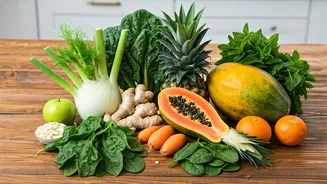Introduction: Gas & Bloating
Gas and bloating are frequent complaints affecting people of all ages, often stemming from the foods we consume and the way our bodies process them. These
symptoms can be triggered by a range of factors, including the rapid consumption of food, swallowing air while eating, and the production of excess gas during digestion. Certain foods are particularly known to contribute to these issues. Understanding the triggers and incorporating specific foods into your diet can significantly alleviate these uncomfortable symptoms. This guide provides a simple yet effective plan to naturally address gas and bloating. From identifying problem foods to exploring digestive aids, this comprehensive look will equip you with knowledge and practical advice to ease these everyday digestive woes.
Peppermint: Digestive Relief
Peppermint has been utilized for generations as a natural remedy for a multitude of digestive problems. Its effectiveness stems from its ability to relax the muscles of the digestive tract, which helps to alleviate spasms and reduce gas buildup. Peppermint contains menthol, an active compound that exhibits antispasmodic properties. The antispasmodic effect allows peppermint to mitigate stomach cramps, bloating, and excessive gas production. Incorporating peppermint into your diet can be as simple as drinking peppermint tea after meals, or using peppermint essential oil in aromatherapy. It is worth noting, however, that some individuals may experience heartburn as a side effect. Therefore, start with a small amount to assess your tolerance.
Ginger: Anti-Inflammatory Power
Ginger has long been celebrated for its versatile healing properties, particularly its ability to aid digestion and reduce inflammation. Within ginger, the compounds gingerol and shogaol are responsible for their anti-inflammatory effects, which can help calm an irritated stomach. Ginger is also known to stimulate the production of digestive enzymes, which can help the body break down food more efficiently and prevent gas and bloating. Incorporating ginger into your diet can involve adding fresh ginger to meals, drinking ginger tea, or taking ginger supplements. It is worth noting that ginger can also help to relieve nausea, making it an excellent all-around remedy for various digestive discomforts. It’s a wonderful natural solution for anyone seeking to improve their digestive health.
Fennel: Digestive Aid
Fennel, both the bulb and the seeds, is a well-known natural remedy for digestive issues. Fennel seeds contain compounds that help to relax the muscles in the gastrointestinal tract, alleviating bloating and gas. Additionally, fennel aids digestion by stimulating the production of gastric juices, helping to break down food more effectively. Fennel is a versatile ingredient that can be consumed in various ways. You can chew fennel seeds after a meal, brew them into a tea, or add the bulb to salads and cooked dishes. Fennel is a great option for anyone wanting a natural way to relieve gas and bloating. Its effectiveness makes it a great addition to any diet.
Chamomile: Calming Comfort
Chamomile, often consumed as tea, is renowned for its calming and anti-inflammatory effects, which can significantly benefit the digestive system. The active compounds in chamomile can reduce muscle spasms in the intestines, thereby alleviating bloating and gas. Chamomile also helps to relax the nerves, which can further improve digestive function. Drinking chamomile tea is a simple and effective way to harness these benefits, especially after meals. For those seeking to soothe their digestive system and promote overall relaxation, chamomile offers a gentle yet effective solution. Its gentle nature makes it suitable for everyday use.
Turmeric: Curcumin's Benefits
Turmeric, with its active ingredient curcumin, is well known for its powerful anti-inflammatory properties, making it an excellent aid for digestive health. Curcumin can reduce inflammation in the gut, which can alleviate symptoms of bloating and gas. It also supports the production of bile, an essential component for the digestion of fats. Turmeric can be incorporated into your diet in various ways, such as adding it to curries, soups, and smoothies. The consumption of turmeric-infused golden milk is a soothing and effective way to benefit from its properties. For those with digestive discomfort, turmeric provides a natural and potentially effective method to reduce inflammation and promote overall gut health.
Pineapple: Enzyme Boost
Pineapple contains the enzyme bromelain, which aids in digestion by breaking down proteins. This action helps to reduce bloating and gas, particularly when eating foods high in protein. Bromelain can also reduce inflammation in the digestive tract, contributing to overall gut health. Consuming fresh pineapple or drinking pineapple juice can introduce bromelain into the diet. The natural sugars in pineapple make it a delicious and beneficial addition to your diet. For individuals struggling with digestive issues, especially those related to protein-rich foods, pineapple offers a flavorful and effective way to alleviate discomfort.
Papaya: Digestive Enzyme Power
Papaya is rich in papain, another enzyme that aids digestion. Papain helps to break down proteins, thereby reducing the likelihood of bloating and gas. It also has anti-inflammatory properties that can soothe the digestive tract. Eating fresh papaya is an effective way to benefit from its digestive properties. Papaya can be incorporated as a snack or as part of a meal. For anyone suffering from digestive issues, particularly those related to protein digestion, papaya provides a naturally delicious solution. Its enzyme-rich nature makes it a great addition to your diet, helping to prevent and alleviate bloating and gas.
Probiotic-Rich Foods: Gut Health
Probiotic-rich foods are fundamental to maintaining a healthy gut microbiome, which is key to proper digestion and reducing bloating and gas. Probiotics introduce beneficial bacteria to the gut, helping to break down food more efficiently and reduce the production of gas. Consuming probiotic-rich foods such as yogurt, kefir, sauerkraut, kimchi, and kombucha can significantly improve gut health. Integrating these foods into your diet on a regular basis supports a healthy balance of gut flora, thereby reducing digestive discomfort. For people seeking to improve overall gut health and reduce gas and bloating, probiotic-rich foods are an excellent and easily accessible choice.
Bananas: Potassium Boost
Bananas are a good source of potassium, an electrolyte that helps regulate fluid balance and reduce bloating. They also contain fiber, which helps promote healthy bowel movements and reduces constipation, a frequent cause of bloating. Eating a banana can help prevent the accumulation of excess fluid in the body. In addition, bananas contain prebiotics, which are beneficial for gut health by feeding the friendly bacteria. Bananas are a convenient and easy snack that can be incorporated into any diet. Those who struggle with bloating can find relief through the inclusion of bananas in their daily food intake.














